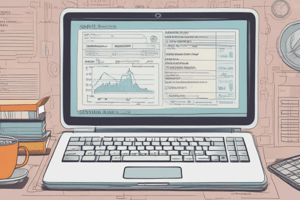Podcast
Questions and Answers
What is a financial instrument according to IAS 32 and IFRS 9?
What is a financial instrument according to IAS 32 and IFRS 9?
- Any financial transaction between two entities
- Only loans and credit contracts
- Only debt securities and equity instruments
- Any contract that gives rise to a financial asset of one entity and a financial liability of another entity (correct)
What is a financial asset?
What is a financial asset?
- Any asset that is a contractual right to receive cash or another financial asset from another entity (correct)
- Any equity instrument of another entity
- Any liability that is a contractual obligation to deliver cash or another financial asset
- Only cash and cash equivalents
What is a financial liability?
What is a financial liability?
- Any equity instrument of another entity
- Any asset that is a contractual right to receive cash or another financial asset from another entity
- Any liability that is a contractual obligation to deliver cash or another financial asset to another entity (correct)
- Any liability that is not a contractual obligation to deliver cash or another financial asset
What is an equity instrument?
What is an equity instrument?
What is an example of a financial asset?
What is an example of a financial asset?
What is an example of a financial liability?
What is an example of a financial liability?
What is the result of selling goods to a customer on credit?
What is the result of selling goods to a customer on credit?
What is an ordinary share?
What is an ordinary share?
How are compound financial instruments classified?
How are compound financial instruments classified?
What is the main criterion for classifying a financial instrument as an equity instrument?
What is the main criterion for classifying a financial instrument as an equity instrument?
What happens to a financial asset when the entity's contractual rights to receive cash from it expire?
What happens to a financial asset when the entity's contractual rights to receive cash from it expire?
How are financial assets measured initially?
How are financial assets measured initially?
What is the purpose of the effective interest method?
What is the purpose of the effective interest method?
How are redeemable preference shares classified?
How are redeemable preference shares classified?
What happens to transaction costs when a financial asset is recognized?
What happens to transaction costs when a financial asset is recognized?
How are financial liabilities measured?
How are financial liabilities measured?
Flashcards
Financial Instrument
Financial Instrument
Any contract that creates a financial asset for one entity and a financial liability for another.
Financial Asset
Financial Asset
An asset representing the contractual right to receive cash or another financial asset from another entity.
Financial Liability
Financial Liability
A liability that involves a contractual obligation to deliver cash or another financial asset to another entity.
Equity Instrument
Equity Instrument
Signup and view all the flashcards
Example of a Financial Asset
Example of a Financial Asset
Signup and view all the flashcards
Example of a Financial Liability
Example of a Financial Liability
Signup and view all the flashcards
Selling Goods on Credit
Selling Goods on Credit
Signup and view all the flashcards
Ordinary Share
Ordinary Share
Signup and view all the flashcards
Compound Financial Instruments
Compound Financial Instruments
Signup and view all the flashcards
Classifying Financial Instruments
Classifying Financial Instruments
Signup and view all the flashcards
Expiration of Rights(Financial Asset)
Expiration of Rights(Financial Asset)
Signup and view all the flashcards
Initial Measurement of Financial Assets
Initial Measurement of Financial Assets
Signup and view all the flashcards
Effective Interest Method
Effective Interest Method
Signup and view all the flashcards
Redeemable Preference Shares
Redeemable Preference Shares
Signup and view all the flashcards
Transaction Costs
Transaction Costs
Signup and view all the flashcards
Measurement of Financial Liabilities
Measurement of Financial Liabilities
Signup and view all the flashcards
Study Notes
Financial Instruments
- A financial instrument is a contract between two entities, resulting in a financial asset for one entity and a financial liability or equity instrument for the other.
Definitions
- A financial asset: any asset that is cash, an equity instrument of another entity, or a contractual right to receive cash or another financial asset from another entity.
- A financial liability: any liability that is a contractual obligation to deliver cash or another financial asset to another entity.
- An equity instrument: any contract that evidences a residual interest in the assets of an entity after deducting all its liabilities.
Examples of Financial Instruments
- Issue of a loan stock
- Selling goods to a customer on credit
- Deposit of money into a bank account
- Bank overdraft
- Ordinary shares (equity instrument)
- Purchase of ordinary shares (financial instrument between issuing and investing company)
Classification of Financial Instruments
- Depends on the substance, not the form
- Classified as an equity instrument if there is no contractual obligation to deliver cash or another financial asset to another entity
- Redeemable preference shares are a liability, with mandatory repayment of share capital and the right to require repayment
Compound Financial Instruments
- Have a liability and equity component
- Determine the fair value of the liability component and equity component
Recognition and Measurement (IFRS 9)
- A financial asset or liability should be recognized when the entity becomes party to the contractual provisions
- A financial asset is derecognized when the entity's contractual rights to receive cash expire
- Measurement is at fair value (normally the amount when acquired or incurred) with transaction costs considered
Studying That Suits You
Use AI to generate personalized quizzes and flashcards to suit your learning preferences.



